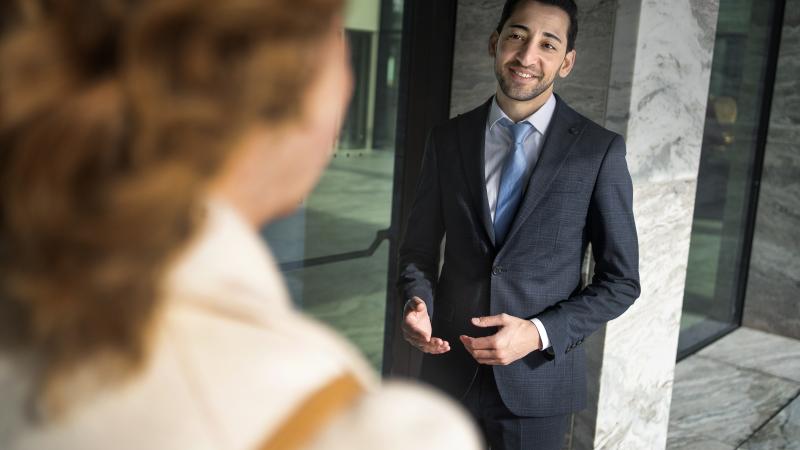I feel satisfied if I’ve carefully weighed up the pros and cons

I feel satisfied if I’ve weighed all pros and cons carefully
Never expected
Serdar studied Administrative Law at Radboud University Nijmegen. Only at the end of his study programme did he have his sights on immigration law. ‘At the very last moment,’ he laughs. ‘I found the subject so interesting that I continued studying longer and took extra courses in the field of migration. During my graduation research into the means requirement for family reunification, I came in contact with the IND. And I’ve now been working here for 5 years. I never could have imagined that during my studies.’
First an interview and decision-making staff member
Serdar’s first job at the IND was as an interview and decision-making staff member. ‘I started working at the Asylum Department, and found that immensely interesting. The job was more intensive than I expected beforehand. Especially because I had contact with applicants all day long and experienced all emotions they were struggling with. Moreover, I was faced with a barrage of policy and information. Deadlines for taking decisions and drafting intentions were short. But I still had it to my liking for two whole years.’
Pleading statements of defence
When there were vacancies in positions as legal representative, Serdar considered this a good, new opportunity. ‘As legal representative you also plead in court. I had never done that before and it seemed interesting to me. A nice step in my development. As a legal representative, you draft statements of defence. And once every few days you go to court to defend the decisions of the IND. This gave me a deeper understanding of law. And now I feel even more responsible for properly weighing the different interests in a case.’
I felt the impact of our decisions
As an interview and decision-making staff member Serdar could still bring good news on a regular basis, but that is different now. ‘As legal representative I’m always defending rejections. That takes extra energy at times. I’m no longer facing happy, joyful people.’ He thinks back to a session on national security. ‘This man was no saint. But when I saw him sitting there on a wooden bench with his wife and children, I felt how difficult things were for them. And I felt the impact of our decision. Even though I stood 100% behind it, and it was the only right choice in legal terms.’
Coaching role
‘It’s sometimes really tough mentally when you come out of the court after a long day,’ says Serdar. ‘Then, at home, I really seek diversion. For example, I can’t watch films about matters I pleaded myself in court.’ At the same time, he cannot imagine himself in a different job. I feel useful and satisfied at the end of a working day. I recently became senior legal representative, which means that I now also support co-workers with files they can’t figure out, and with complicated legal issues. I take a lot of pleasure in this coaching role.’
Paying attention to one another, emotions and the human dimension
Just as Serdar helps his – often younger – co-workers, he also feels supported himself. ‘We pay a lot of attention to one another and to the emotional side of our work. The “human dimension” is also often discussed. A frequently heard question at our department is, for example, “I know that this decision is legally correct, but is it also desirable?” I’m very pleased that at the IND we can always turn to one another to discuss dilemmas and emotions. Sometimes you want yourself to be heard for a moment.’